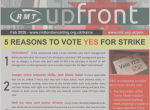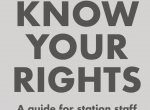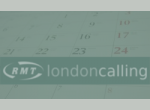They say: New technology means that London Underground needs fewer staff.
We say: New technology can improve London Underground if it is used alongside staff, not instead of us. But LUL is developing technology specifically for the purpose of getting rid of jobs - this is the rationale behind driverless trains or 'wave and pay'. LUL should develop different technology that works effectively with staff to improve the service.
Current plans for technology will worsen the service, increase unemployment and are a waste of public money.
Remember: technology breaks down sometimes, and can not substitute for the human touch: it can not apply an emergency brake, reassure a distressed passenger, check a train is empty, see and fix every fault, prevent someone being attacked, or raise the alarm in every emergency.
They say: In the current economic climate, the government can not afford to give TfL enough money to keep all its staff.
We say: In previous recessions, such as in the 1920s and 1930s, the government gave extra funding to LU, both to improve services (extending lines, opening new stations, etc) and to create jobs at a time of high unemployment. The government should do that now.
London’s Underground gets a smaller proportion of its income from government grants than any other capital city’s metro system; if their governments can afford higher funding, so can ours.
They say: TfL has to make savings.
We say: LU is carrying a record number of passengers and receiving a record amount of fares income. If TfL must make savings, perhaps it should start with the over-inflated salaries at the top!
They say: “London Underground must adapt and embrace change” (Mike Brown, Daily Telegraph, 24.10.11)
We say: Yes, but only if it is change for the better!
They say: “We will put in ... driverless trains” (Boris Johnson, Tory Party conference, 2012)
We say: No-one wants driverless trains, other than a handful of reckless union-haters. RMT will stop driverless trains, and resist all LU’s moves to research, commission and test them.
IN NUMBERS:
- £359m TfL assets
- 1.17bn LU passenger journeys, 2011/12
- £1,981m income from LU fares, 2011/12
- £1,050m cost of staffing LU, 2011/12
- £2m LUL directors’ remuneration, 2011/12
- 365 TfL staff paid more than £100,000, 2011/12
- 112 ‘golden goodbye’ payoffs of more than £100,000 each, 2011/12
- £15,000 average weekly pay of Rob Holden when he was Chief Executive of Crossrail
They say: “Oyster has changed the way customers pay for travel, radically reducing demand for ticket selling.” London Underground’s Operational Vision document, 2 November 2011
We say: London Underground has driven this change itself, by cutting ticket office opening hours, promoting and incentivising other outlets, and imposing the £5 minimum top-up. But people still need help with their tickets and fares, and there are still queues at many ticket offices.
They say: LU has a vision for a world-class London Underground; the unions are just stuck in the past.
We say: LU’s vision is of a de-staffed Underground, with passengers left to fend for themselves, a fantasy system that runs like a toy train set. RMT has a different vision for a future Tube:
- London Underground to be fully integrated, publicly owned and publicly accountable
- fully staff the system - reverse job cuts in all areas
- large-scale public investment to fund new lines, extensions, increased capacity, make the Tube fully accessible, and create jobs and apprenticeships
- new technology to be used to complement staff, improve services, and increase
- significantly cut fares, with open and accessible ticket offices
Read more from our No Job Cuts newsletter here. You can also request copies to distribute in your workplace.
- 2924 reads






